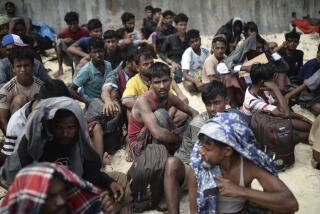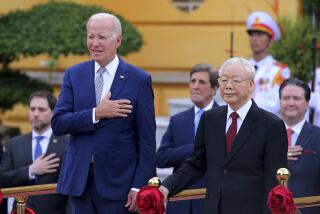Clinton to visit Myanmar
President Obama announced Friday that he is sending Secretary of State Hillary Clinton to Myanmar next month, citing progress made by the government in releasing political prisoners, loosening media restrictions and opening its repressive political system.
Obama, in a brief statement during a series of summit meetings in Bali, Indonesia, said Clinton will be the first secretary of State to visit the country in half a century and will make the case that Myanmar’s leaders must keep moving toward a more open, democratic government.
While flying on Air Force One from Australia to Bali on Thursday night, Obama said he spoke to Aung San Suu Kyi, the pro-democracy leader who was held in detention by the government for much of the last 20 years. It was their first conversation, Obama said, and she told him that she wanted to see American “engagement” in Myanmar, also known as Burma.
“We want to seize what could be a historic opportunity for progress and make it clear that, if Burma continues to travel down the road of democratic reform, it can forge a new relationship with the United States of America,” Obama said.
Clinton “will explore whether the U.S. can empower a positive transition in Burma and begin a new chapter between our countries,” the president said as the secretary of State stood by his side but made no comment.
Meanwhile, Myanmar was chosen late Thursday by leaders of the Assn. of Southeast Asian Nations, or ASEAN, to hold the trade group’s rotating chairmanship at the group’s Bali summit, giving the isolated nation the diplomatic recognition it has long craved.
“All leaders are in agreement that significant changes, significant developments, have taken place in Burma, and those changes have made it more conducive for Burma to carry out this responsibility,” Indonesian Foreign Minister Marty Natalegawa said.
Myanmar has been ruled for decades by a military government that has imprisoned thousands of political prisoners, placed pro-democracy leader Suu Kyi in detention, disregarded elections and maintained tight control over its people.
Over the last year, however, the military government has held elections, released Suu Kyi from house arrest and engaged in direct talks with her, freed 200 of the estimated 2,000 imprisoned dissidents and halted work on a controversial dam financed by China. It has also passed a law giving workers the right to strike and in recent weeks held a summit with China’s potential counterweight, India.
The apparent turnaround has intensified debate abroad over whether engagement with Myanmar — long favored by Asian neighbors keen to do lucrative business deals with the resource-rich nation — or a tougher line is the best way to foster democratic change.
Complicating the mix is Myanmar’s relationship with its neighbor and close ally China, which has enjoyed significant political and economic influence in the country. Some in the West now argue that early engagement with Myanmar — regardless of ongoing human rights violations — is a way to blunt China’s growing clout in the region.
“It seems to be a real change and an opportunity to pry that country from China,” said David J. Karl, president of Los Angeles-based Asia Strategy Initiative, a consulting firm.
The twin moves of ASEAN leadership and the announced Clinton visit are a game-changer and something of a gamble for Washington.
The actions bring Myanmar in from the cold, something the regime has long sought. But if the military-led government backtracks on reforms or mounts another brutal crackdown, as it has done repeatedly when its grip is threatened, Washington will have squandered some of its leverage by betting on change that failed to endure.
Nobel Peace Prize laureate Suu Kyi has played a key role in the country’s transformation. Knowing that the West takes its cue from Suu Kyi in assessing change in the nation, Myanmar officials have reached out to her, allowed her to travel across the country and paved the way for her once-banned National League for Democracy to reenter politics.
But rights groups and dissidents counter that she has a self-interest in working with the regime to rebuild her party and power base. They also note that she has not been granted an audience with key members of the military government who run the country from the new capital, Naypyidaw.
Even as the regime is trying to shake off its reputation as an international pariah, Obama has cautioned against engaging precipitously with the ruling generals.
On a stop in Australia this week before arriving in Bali on Thursday, Obama said his administration would maintain its carrot-and-stick approach. “Violations of human rights persist,” he said, adding that the U.S. would pursue further change by balancing engagement with sanctions.
“The reforms [in Myanmar] may not reach the level that makes everybody happy,” Malaysian Prime Minister Najib Razak said in Bali, “but as far as ASEAN is concerned, they are positive and encouraging signs.”
Although analysts say that it is difficult to assess why Myanmar is adopting even a modest policy of opening up after decades of hard-line rule, Southeast Asian nations historically have been wary of Chinese domination. And Myanmar, once a great kingdom, has watched with envy as its neighbors grew rich by welcoming Western foreign investment and trade.
“It may be a feeling in Myanmar that it needs to reach out, that its economy needs a change of strategy and a belief that it’s grown too dependent on China,” Karl said.
Nicholas reported from Bali and Magnier reported from New Delhi.
More to Read
Start your day right
Sign up for Essential California for news, features and recommendations from the L.A. Times and beyond in your inbox six days a week.
You may occasionally receive promotional content from the Los Angeles Times.






